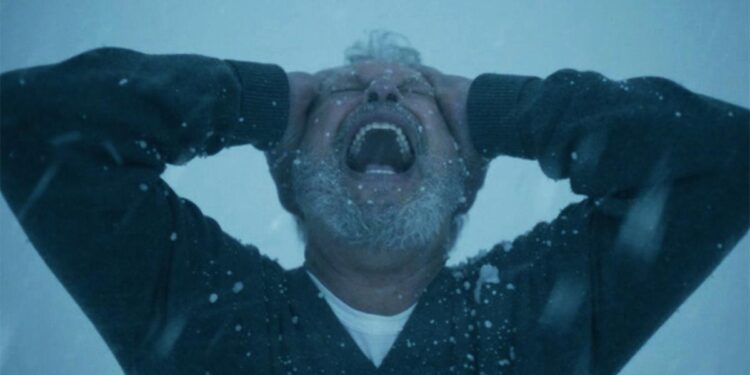Is Dr. Eli Adler close to cracking the case of Noah, his supernaturally afflicted young patient? Let me see a show of hands!

This climactic act of self-harm is one of Before’s gnarliest moments yet, which is saying something. I’ve yet to find the show genuinely scary — the rapid editing of many of the frightening visions and the breakneck pace of these short episodes overall largely preclude building any sense of real dread — but it’s admirably disgusting, that’s for sure. Billy Crystal just did the Joker’s disappearing pen trick on his own hand, for crying out loud. Not something you see every day! (What is it with this guy and pens, by the way?)
Joseph Sousa and Audrey Rosenberg are the writers entrusted not just with this splatterific moment, but with clearing up two of the most important questions in the show. First: Did Eli kill his wife? The answer is yes, but not in the way you might think. During what amounts to an intervention in the hospital, where he’s been involuntarily committed after his infection-induced psychosis last episode, Eli confesses to his assistant Cleo, his daughter Barbara, and his colleague Jane that his hallucinatory ravings were, in this case, true. He found Lynn alive, not dead, in the midst of a failing suicide attempt. What he did was help her finish the job. “What else could I do?” he asks plaintively.

Surprisingly — bizarrely, even — the group’s answer is “not much, buddy, you’re right!” After an initial retreat from the reality of it all, Barb lets Eli know her only real objection is that he hand’t helped her die sooner, given all his access to drugs that would have made it painless. You might expect the police to be called, but all three women apparently agree it was the right thing to do, or at least that helping someone with a painful terminal illness die on their own terms should not be a crime. Our last glimpse of the spectral Lynn in this episode is of her smiling at Eli, and him smiling back; it seems what she wanted out of him wasn’t a confession of murder, but acceptance of what he’d done for her.
The second question this episode tackles is the show’s central mystery. What the hell is happening to Noah, and how are Eli and Lynn connected to it so strongly? When Noah’s desperate foster mother Denise turns to the institutionalized Eli for help after realizing she no longer has any legal right to control Noah’s course of treatment, Eli lays out his theory of the case.
His “feeling” — he won’t even call it a theory — is that he, Lynn, and Noah knew each other “in a previous life. Previous lives, actually.” Something bad happened to the three of them at the ominous farmhouse, and until they get to the bottom of what that is, they’re stuck in this recurring nightmare. “Three souls connected through time, trapped by a long-ago trauma,” is how he poetically puts it. “Whatever happened then is why Noah can’t get better now.”
Hence the hand impalement. With Denise’s rights signed away to the state and Eli pulled from the case and involuntarily held for observation, Eli’s only play is to get himself moved to a part of the hospital without locked doors, by any means necessary. Once he pulls that off, he runs, stealing the easily identifiable ambulance in which Noah waits to be driven to a new facility, which would be a nightmare for him even in the unlikely even that he survives the paranormal hypothermia currently afflicting him. Their new destination is, of course, the farmhouse. It’s got a real end-of-Fargo, “He’s fleein’ the interview!” vibe to it.

But it should also be noted that the hand injury, Eli now sees, corresponds to a similar wound on the hand of one of the little children in Lynn’s cryptic illustration, which he tears up earlier in the episode only to reassemble under the watchful eyes of his fellow patient Charlie (Stephen Wallem). Charlie, whose primary interest is to get Eli to respond properly to his offering of a knock-knock joke, leaves him with this punchline: “How will you know if you don’t open the door?” That farmhouse sure wants Eli and Noah to come back alright! You could even see the pen incident as an attempt to deepen his connection to the children in the picture by reopening his previous wound.
All of this happens in the timespan of a network sitcom, which is wild to me. The show’s speed and staccato rhythm are unique, that’s for sure, though I’m not convinced they’re good for tension, fear, or atmosphere. What they do provide is an effective simulacrum of what Eli Adler’s battered brain must be going through. By the end of any given episode, you’ve seen so many insects and torn pages and bodily injuries and drowned ghosts and shots of Eli screaming in the snow, and (this is especially true of this episode) heard increasingly maddening noises like the drip-drop of a bathtub, the tick-tock of a clock, or the click-clack of a retractable pen, that shish-kebab’ing your hand almost feels like a reasonable response.
Sean T. Collins (@theseantcollins) writes about TV for Rolling Stone, Vulture, The New York Times, and anyplace that will have him, really. He and his family live on Long Island.





